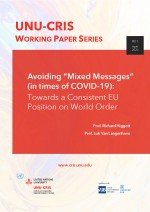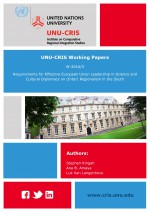Inter-regionalism and the Future of Multilateralism
In this paper, it will be argued that we are currently witnessing a transition from theclassical Westphalian world order to a world order where regions – next to states – play a central role and where processes of regional integration increasingly shape international relations. This transition is linked to a series of transformations in the nature and scope of regional integration processes. After a first generation of regional integration that focussed primarily upon trade and regional integration, a second generation – often referred to as ‘new regionalism’ – broadened regional integration to internal policies and regulations. Today, a third generation of regionalism is emerging that emphasises the role of regions as global actors. This third generation regional integration can lead towards a new ‘regional world order’ that is not post-Westphalian but rather neo-Westphalian as it still builds upon statesas key actors but in a broader regional framework. Viewed from a U.N. perspective,this emergent world-order opens possibilities to re-think multilateralism into what Hettne (2003) has called “multiregionalism”. But for this to happen, the U.N. will have to find ways to better incorporate regions and regional integrations in its functioning. The institutionalisation of the regional-global co-operation in the security field represents a first step on this road.



